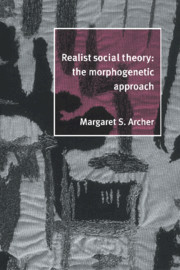Book contents
- Frontmatter
- Contents
- List of figures
- Acknowledgements
- 1 The vexatious fact of society
- Part I The problems of structure and agency: four alternative solutions
- Part II The morphogenetic cycle
- 6 Analytical dualism: the basis of the morphogenetic approach
- 7 Structural and cultural conditioning
- 8 The Morphogenesis of agency
- 9 Social elaboration
- Index
6 - Analytical dualism: the basis of the morphogenetic approach
Published online by Cambridge University Press: 02 December 2009
- Frontmatter
- Contents
- List of figures
- Acknowledgements
- 1 The vexatious fact of society
- Part I The problems of structure and agency: four alternative solutions
- Part II The morphogenetic cycle
- 6 Analytical dualism: the basis of the morphogenetic approach
- 7 Structural and cultural conditioning
- 8 The Morphogenesis of agency
- 9 Social elaboration
- Index
Summary
Society is that which nobody wants, in the form in which they encounter it, for it is an unintended consequence. Its constitution could be expressed as a riddle: what is it that depends on human intentionality but never conforms to their intentions? What is it that relies upon people's concepts but which they never fully know? What is it that depends upon action but never corresponds to the actions of even the most powerful? What is it that has no form without us, yet which forms us as we seek its transformation? And what is it that never satisfies the precise designs of anyone yet because of this always motivates its attempted reconstitution? To recognize the unique kind of reality with which we are dealing in this ‘vexatious fact of society’ is to acknowledge the difficulty of the theoretical enterprise but also the impossibility of taking analogical short-cuts.
On the one hand, in asserting that society is never exactly what anyone wants, in emphasizing this as the underlying motor of change, in stressing that the social origins of particular transformations lie in structured struggles, in underlining that resulting social forms are generated and elaborated from this parallelogram of pressures, it is also acknowledged that social structuring, as a process which is continuously activity-dependent is also one which is uncontrolled, non-teleological, non-homeostatic, non-adaptive and therefore unpredictable. Its form is shaped by the processes and powers whose interplay accounts for its elaboration. At any given time, structure itself is the result of the result of prior social relations conditioned by an antecedent structural context.
Information
- Type
- Chapter
- Information
- Realist Social TheoryThe Morphogenetic Approach, pp. 165 - 194Publisher: Cambridge University PressPrint publication year: 1995
